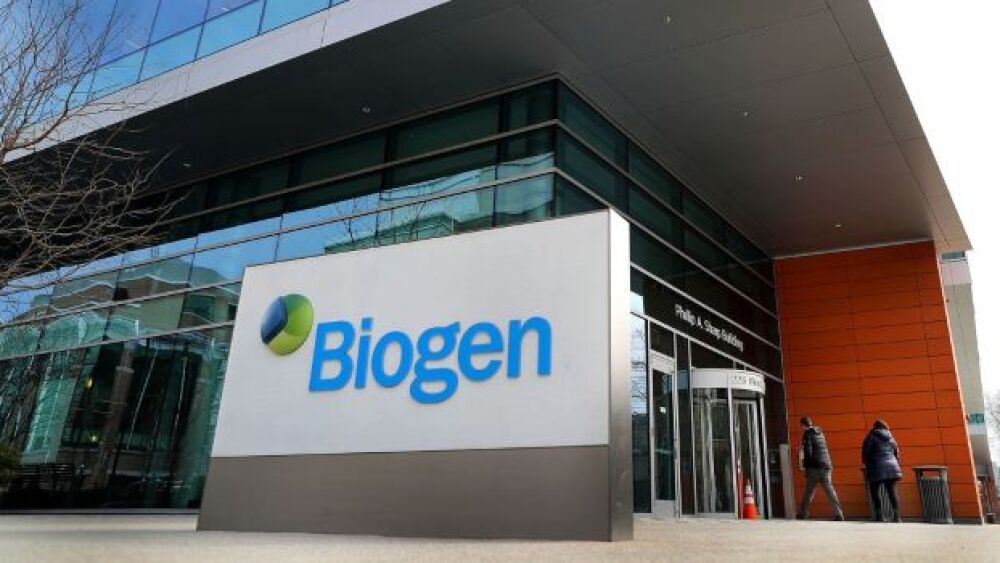Korea Economic Daily, published a story saying that Samsung Group was in talks to acquire Biogen. However, Samsung BioLogics stated in a regulatory filing yesterday that the rumor is not true.
John Tlumacki/The Boston Globe via Getty Images
On Wednesday, a South Korean newspaper, Korea Economic Daily, published a story saying that Samsung Group was in talks to acquire U.S.-based Biogen. However, Samsung BioLogics stated in a regulatory filing yesterday that the rumor is not true.
Biogen is currently known for its controversial Alzheimer’s drug Aduhelm (aducanumab). However, the company also has a strong neuroscience portfolio that includes medicines for multiple sclerosis and spinal muscular atrophy (SMA) and several biosimilars.
The original report said a potential deal would be valued at more than $42 billion. The story pointed out that Biogen’s revenue was relatively stable compared to “cyclical industries like semiconductors,” which is a driver of Samsung’s revenues. Korea Economic Daily cited unnamed investment banking sources.
Biogen shares popped more than 9.5% at the news, although it dropped after the regulatory filing discounting the rumor. Biogen reported $13.4 billion in revenue in 2020 and counts 9,100 employees.
Samsung is known for its computer chips. However, Biogen owns less than half of Samsung Bioepis, a joint venture that develops biosimilars. To date, five biosimilars from Samsung Bioepis have been approved by the U.S. Food and Drug Administration.
According to the original story, Biogen approached Samsung. A Biogen spokeswoman, Ashleigh Koss, stated, “We do not comment on market rumors or speculations.”
Michael Yee, managing director of investment firm Jefferies, said, “I don’t think it’s totally shocking. The stock is currently underperforming, and that’s why ultimately it becomes a target.”
He went on to note that Samsung might be considered an unusual buyer because it’s not traditionally a big pharma player on the world stage. However, that might be why a company like Biogen could be of interest.
“The buyer may not have a lot of U.S. or global exposure, and you would purchase [Biogen] to gain that exposure and access,” Yee added. He also said it could be an improvement for Biogen staff since with Samsung there would be less likelihood of job cuts after a merger due to overlaps. “It would potentially be very intriguing if all of this is because Samsung wants to further invest in the businesses, grow [them], and perhaps add more resources.”
Earlier this month, Biogen announced it planned to lay off as many as 1,000 staffers, mainly due to the disastrous rollout of Aduhelm. The FDA approved the drug in June via an accelerated approval pathway. However, the agency’s advisory committee overwhelmingly rejected recommending the drug, and there are still questions about its clinical benefit, which also comes with a risk of brain bleeds and an initial price tag of about $56,000 per patient per year. The company recently announced it was cutting the drug’s wholesale acquisition cost (WAC) in half to $28,200 for a 10 mg/kg maintenance dose.
The company and analysts had projected Aduhelm sales of $10.79 for the third quarter, but Biogen reported a dismal $300,000 in sales for the period. The Centers for Medicare & Medicaid Services (CMS) have not yet decided on coverage for the drug, and insurers, for the most part, either delayed their decision or outright declined to cover it, arguing that the drug is experimental, despite the FDA approval.
Meanwhile, Biogen’s top drug, Tecfidera (dimethyl fumarate), has been hammered by competition in the multiple sclerosis market and loss of patent protection. The company reported $3.84 billion in sales in 2020, but GlobalData has forecast it will drop to $1.12 billion in 2026. Not only will it face generic competition, but second-generation sphingosine-1-phosphate receptor modulators, such as Novartis’ Mayzent (Siponimod fumerate), Celgene‘s Zeposia (ozanimod), and Janssen‘s Ponvory (ponesimod), are eating away at Tecfidera’s market share.





